Who has the greatest risk of experiencing nursing home discrimination?
Nursing Home Abuse - May 16, 2023
Unfortunately, nursing home discrimination and resulting abuse is an ongoing problem, and certain groups of people may be targeted more than others. Understanding who these people are may help you better recognize signs of abuse and protect your elderly loved one if they’re at risk.
Continue reading to learn more, then contact Horwitz, Horwitz & Associates if you need personalized assistance from a nursing home abuse lawyer in Illinois.
At-risk groups
Nursing home staff aren’t immune to the same biases and prejudices that exist in society at large. As a result, the people most at risk of suffering discrimination-based nursing home abuse are often those who are commonly targeted by other forms of discrimination.
People with intersecting identities — those who identify as multiple marginalized identities — may be even more vulnerable.
Racial and ethnic minorities
Individuals belonging to the BIPOC (Black, Indigenous, and people of color) community are disproportionately affected by all forms of mistreatment in the healthcare system, including nursing home abuse.
Although few studies have been conducted on this specific phenomenon, there’s strong evidence of widespread racial disparities in terms of quality of care, including nursing home discrimination.
For instance, one study found that long-term care residents of ethnic and racial minorities are more likely to complain of residents’ rights violations than their white counterparts, and their complaints were also resolved more slowly.
LGBTQ+ individuals
An estimated 1.1 million American adults age 65 and older currently identify as lesbian, gay, bisexual, or transgender. Because they’re less likely to have children than their heterosexual counterparts, individuals of this demographic have a greater need for nursing home care, yet they’re also particularly susceptible to discrimination.
Unfortunately, limited research is available on LGBTQ+ seniors’ experiences of mistreatment in nursing homes, but anecdotal evidence suggests that abuse related to nursing home discrimination is a reality for many.
Women
While women can be subject to all forms of abuse in nursing homes, they are particularly vulnerable to sexual assault or harassment. Studies show that one in six American women will experience attempted or completed rape at some point in their lives, and there is no age limit to the potential for this type of mistreatment.
People who commit acts of sexual violence are often driven by power and control. Women in nursing homes are already in a precarious position of vulnerability, and abusers may seek to exploit this circumstance to their advantage.
Residents with dementia
According to the National Center for Victims of Crime, approximately half of people with dementia suffer abuse or neglect by caregivers, and nursing home settings are no exception.
Individuals with dementia have greater difficulty recognizing and defending themselves against mistreatment, which makes them easy targets for abusers. They’re also more likely to rely on their caregivers for assistance with eating, bathing, and using the bathroom — activities that can readily become grounds for abuse.
Consequences, prevention, and response
From an increased risk of premature death to post-traumatic stress disorder, to physical injury, nursing home abuse can have a devastating impact on victims and their families. Fortunately, individuals and communities have the power to protect those in the greatest danger — but only if they’re aware of the signs and take appropriate action.
Common signs of nursing home abuse or neglect include:
- Unexplained bruises, marks, or physical injuries
- Sudden changes in behavior or attitude
- Withdrawal from favorite activities or people
- Unexplained weight loss
- Lack of basic hygiene
- Unsanitary living conditions
If you notice any of these signs in an Illinois nursing home resident, you can report your suspicions to the Office of the Inspector General (OIG) hotline by calling (800) 368-1463. The Illinois Department of Health also offers a few different ways to file a complaint. These options won’t result in an immediate response from authorities though, so don’t hesitate to call 911 if you think someone is in immediate danger.
Our nursing home abuse attorneys can help
At Horwitz, Horwitz & Associates, we’re dedicated to helping injured people seek justice and compensation, and that includes victims of abuse and neglect due to nursing home discrimination.
If you or a loved one was the victim of nursing home abuse, a Chicago nursing home abuse attorney at our firm can help you understand your legal rights. Contact us today at (800) 985-1819 for a free consultation.



